Final report for ES17-137
Project Information
Cooperators
- (Educator)
- (Educator)
- (Educator)
- (Educator)
- (Educator)
- (Educator)
- (Educator)
Education
- Proper pre/post -harvest handling techniques
- Maintaining the cold chain
- Cleaning and drying
- Low-cost options for curing and storing of root vegetables
- Produce washing, grading and packing
- Developing relationships with buyers and needs of wholesale buyers
- Best food safety practices
- Scale-appropriate equipment and infrastructure for affordable processing
Education & Outreach Initiatives
The primary objective of the program is to train agriculture professionals and educators to aid them in helping small- and mid-scale produce farmers to adopt best produce harvesting and post-harvest practices to meet stringent market standards for quality and food safety.
A series of in-person and conference call planning meetings were held beginning in early 2017 to develop training curricula, agendas and schedules for the Wholesale Success training events to be conducted in the first year, 2017. Participants providing input into the planning process included farmers and food hub managers, 1862 and 1890 Extension agents, and NGO partners including representatives from the Carolina Farm Stewardship Association, Lowcountry Local First, and FamilyFarmed staff and training instructors. Two full-day training events were scheduled for fall 2017 at the Clemson Coastal Research & Education Center (CREC) in Charleston (lowcountry region) and at Clemson University (upstate region), respectively. The training curriculum was drawn from the FamilyFarmed Wholesale Success manual and customized based on input from stakeholders and from training instructor Atina Diffley. Training agendas at both locations included a classroom session covering various topics related to recommended harvest and post-harvest handling methods including:
- Produce respiration and influence of temperature on quality loss
- Field to box postharvest processes; initial process diagram
- Best postharvest methods for different vegetables
- Packing shed design
- Packing standards and grades
Hands-on produce processing demonstrations were also planned at nearby produce processing facilities (both locations). At the CREC location, grant funds were used to upgrade and convert a sweetpotato grading shed into a GAPs compliant produce processing facility for demonstration and training purposes. Upgrades included installation of washable surface wall-board, produce washing and drying areas with proper drainage, and areas for storage. This facility was used for demonstration during the CREC training as part of this project, and is available for future trainings on produce handling and GAPs certification. The Clemson Organic Farm produce processing area was used for demonstration during the Clemson training.
Full-day training events were held on November 6 at the Clemson CREC in Charleston, and on November 9 at the Clemson University Madren Conference Center and the Clemson Organic Farm. Training announcements with agendas and pictures from both events are attached. There were 54 participants at the Charleston event and 28 participants attending the Clemson training. Participants included Clemson and South Carolina State University Extension agents and trainers representing governmental and NGO organizations. Leading produce farmers who are in a position to mentor other farmers, including farmer mentors involved in the SC New and Beginning Farmer Program, were also invited to attend.
WHOLESALE SUCCESS_Flyer for Clemson and Charleston
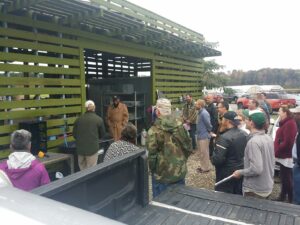
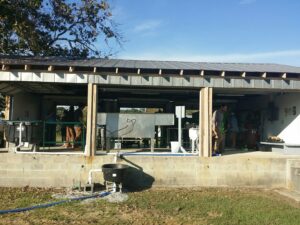
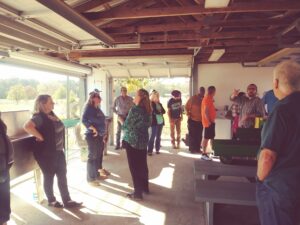
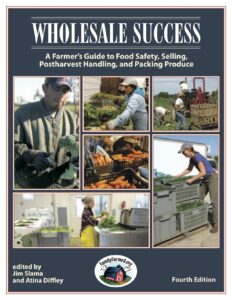
YEAR 2: In-person and conference call meetings with stakeholders and the project team were organized in early 2018 to develop an agenda and schedule for the second-year training. The 2-day training was held on May 4 and 5, 2018 at City Roots Farm in Columbia, SC. Training instructors were Atina Diffley, lead trainer for FamilyFarmed and Eric McClam, farmer and owner of City Roots Farm. The objective of this training was to guide participants in developing skills that are key to success in the marketplace, including in harvesting, washing, cooling and packing methods for different types of vegetables that yield a high quality product and minimize food safety risks. Based on feedback from the 2017 Wholesale Success trainings, in addition to critical information on best harvest- and post-harvest handling practices to meet market standards, participants gained first-hand experience in the field and processing shed with harvesting and processing various types of vegetables (please refer to the attached workshop agenda). Participants in the training included Extension agents and other agricultural professionals who train produce farmers, including farmer-mentors (38 attendees). On the second day, May 5, selected participants had an opportunity to meet with Atina Diffley to learn about her experiences with teaching best harvest and post-harvest handling techniques and strategies for effective engagement with different types of farmers. There was ample time for discussion and Q & A.
Flyer for Wholesale Success Trainning at City Roots Farm
Agenda For Wholesale Success Training at City Roots Farm
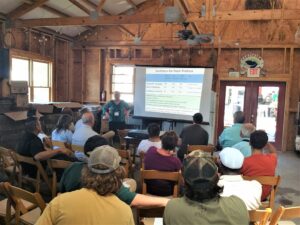
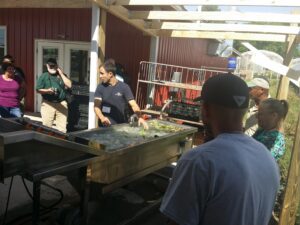
Additional Wholesale Success training manuals were distributed to selected participants who attended at least two training events. Manuals were also distributed to SC Food Hub managers and key personnel via the statewide Food Hub Network coordinator.
The near term outcome of the project is the establishment of a core group of agricultural professionals with necessary knowledge and skills who can assist farmers with adoption of best harvesting and post-harvest handling practices to access wholesale markets and also to improve the quality of their produce for direct markets. As of this writing, additional Wholesale Success training and individualized farmer assistance is being offered throughout South and North Carolina by agricultural professionals who participated in this SARE PDP training project.
In the long term, the project will result in a greater number of local farms who are able to sell products to wholesale market outlets thereby increasing farmers’ market diversity and economic viability, and a greater number of consumers with access to fresh, local produce.
Educational & Outreach Activities
9-11 AM - Atina Diffley discussed her experiences teaching the Wholesale Success material along with strategies for effective engagement with different audiences. Plenty of time was available for Q&A and discussion.